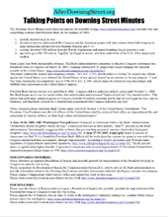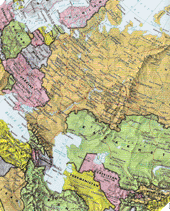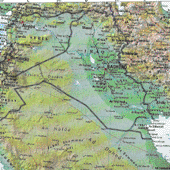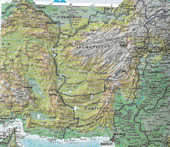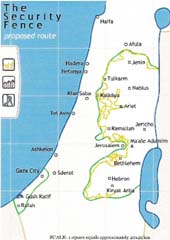|
|||||||||
|
|
Search Engines
![]() ask Jeeves
ask Jeeves ![]() Google.com
Google.com
![]() Mama.com
Mama.com ![]() Excite
Excite
![]() AOL Netfind
AOL Netfind ![]() Lycos
Lycos
![]() Webcrawler
Webcrawler ![]() Yahoo
Yahoo
![]() technorati (searches blogs)
technorati (searches blogs)
Tip: Some search engines like Google give preference to pages containing Google ads, frustrating search results for scholars.
|
Metric Conversion kilometer: 0.6214 mile |
|
New paper that could lead to the impeachment of President George W. Bush. Click on image for pdf. file download. |
 |
|
Federal Debt vs GDP– Click image for larger view. (OMB) |
 |
|
Chart showing National Debt & Annual Deficits with Presidents. Democrat administrations are blue, Republican in Red. Green reflects projected Bush debt. Click chart for larger image. |
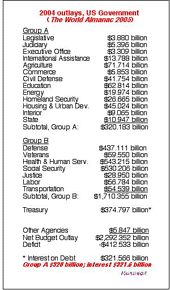 |
|
Interest exceeds Group A outlays. Click chart for larger image. |
| Gross Domestic Products. Click here for image. |
![]() Worth frequent visits
Worth frequent visits
Skippy the Kangeroo
grumpy old man (PG-18)
Democratic Underground
Altercation
American Politics Journal
American Progress Report
Americablog
Earth-Info.net
Aral Sea Disaster
oilonline.com
Media Matters
Take Back the Media
Greg Palast
afterdowningstreet.org
Big Brass Alliance
DOD News
The New Yorker magazine
Halliburton watch.org
First Read (MSNBC)
GLOBEANDMAII.COM
liberation.fr (en français)
lefigaro.fr (en français)
Spiegel Online
La Repubblica.It
Arch. & Prehistory news
New Scientist
National Public Radio
![]()
![]()
![]()
![]()
ABC News
Fox News
![]()
CNN
![]()
![]()
Financial Times
Bloomberg.com
Sky News (London)
timesonline.uk (London)
![]()
The Independent
![]()
![]()
telegraph.co.uk
DW-World.DE
NIS News (Holland)
Belfast Telegraph
Radio Free Europe
Radio News America
AFP
![]()
![]()
![]()
![]()
Detroit Free Press (Freep)
![]()
![]()

International Agencies – News
This monster's own words will
lead to his destruction
Definition of fatwa (fatwah)
Maravot News Comment
12.17.04
10.29.04
2.23.98
August 1996
Maps of interest
![]() TurkishPress.com
TurkishPress.com
![]()
![]() Al-jazeera
Al-jazeera
![]()
kurdistanobserver
![]()
Iraq the Model (Blog)
Azzaman.com (Iraq)
Iran Focus
Iran Daily
Iranmania.com
![]()
Middle East Newsline
![]() Jerusalem Post
Jerusalem Post
![]()
![]() Haaretz Daily
Haaretz Daily
![]()
pmwatch.org
Palestine Chronicle
![]() Daily Star (Lebanon)
Daily Star (Lebanon)
![]()
topix.net (Qatar)
Saudi Post
Yemen Daily
![]() Khaleej Times (Yemen)
Khaleej Times (Yemen)
tajikistannews.net/
Khabar.kz
Russia & Ukraine Watch
East Asia Watch
![]() Jang.com.pk
Jang.com.pk
![]()
Dawn
Daily Times,com. pk
South Asia Tribune
asianage.com
![]() India Express
India Express
![]()
Indo-Asian News Service
New Kerala (India)
![]()
Hindustan Times
![]()
xinhuanet (China)
![]()
Asia Times (Hong Kong)
asianewsnet.net
![]() China Daily
China Daily
![]()
Shenzhen Daily
CRI online (China)
Big News Network
![]() Korea Herald
Korea Herald
![]()
Kyodo News
![]()
Japan Times
![]() Japan Today
Japan Today
![]()
Daily Yomiuri (Japan)
![]() The Star (Malaysia
The Star (Malaysia
![]()
![]() The Jakarta Post
The Jakarta Post
![]()
Bangkok Post
![]()
The Nation (Bangkok)
Kashmir Times
Press Trust of India
![]()
Daily News (Sri Lanka)
LankaPage (Sri Lanka)
inq7.net (Phillipines)
![]() news.com.au
news.com.au
![]()
theaustralian.news.com.au
![]()
![]()
![]()
![]()
![]()
because of me, Dec. 1993
content of any links
from this site.
|
|
On Liberty, J. S Mill
Works of Josephus
Juvenal, Sixteen Satires
Bible Concordance
Koran
Links to Biblical documents
Joinville & Villechardouin,
Chronicles of the Crusades
Polybius
Plutarch's "Lives"
Tacitus
Lives of the 12 Caesars
Meditations, M. Aurelius
Memorabilia (Xenophon)
The Offices (Cicero)
Leviathan (Hobbes)
The Secret History
(Procopius)
Herodotus
maravot,
links & works
![]()
![]()
![]()
![]()
![]()
![]()
![]()
![]()
![]()
![]()
![]()
![]()
![]()
![]()
News Headlines & Trends – Page 2
09.17.05 Has the world become revolted against Bush Bullying? (continued)
One of the sad elements in Bush's power politics is its failure to form a coherent and consistent policy with regard to foreign relations, embarrasing the US before the world. This is no more evident than in the issue involving North Korea. A while back I carried a report of "Creeping Capitalism" in North Korea, which is a positive sign, where business developments from South Korea were taking hold in North Korea, in the building of a duty-free zone, etc. It was "Creeping Capitalism" that successfully converted China into this new era's leader. It is the second strongest economy in the world at this moment, next to the US, and in an article in today's Guardian, "China will soon be the world's largest exporter" :
"China's explosive rise to economic superpower status was confirmed yesterday by the west's leading thinktank in a new report predicting that it would leapfrog the United States and Germany within five years to become the world's biggest exporter. Despite growing social strains and international concerns, the Organisation for Economic Cooperation and Development said there would be no let-up in China's breakneck growth.
China is not a member of the OECD - a group of the world's richest developed nations - but the Paris-based organisation published its first report yesterday on a country that has been transformed within a quarter of a century from struggling peasant economy to industrial titan."
Recognizing this, the trend should be for "Creeping Capitalism" into North Korea from both China and South Korea (who probably share those interests). But the Bush administration has been dashing such efforts to the ground through verbal abuse of North Korea (insulting heads of state is Bush's way of diplomacy) and not taking a consistent position in the negotiations with North Korea.
China sees herself as a leader in developing the underdeveloped nations. Both China and India have had their eyes on Africa, for instance, and in the bidding wars on oil (oil is the primary resource both need) China has been winning. Their actions can be contrasted with those of the Bush administration whose focus is more on power politics through military dominance. Winning the oil by conquest is Bush's strategy.
Japan is the other important party in the power politics struggle. The United States is closing its bases in Japan, forcing Japan to reconfigure its defense plans (building offensive military weapons) to fill the void the US will leave when it moves its Pacific Fleet headquarters to Guam. Both South Korea and China have issues with Japan's conduct in W.W.II and failure to show adequate remorse or reparations for its occupation of those nations. Japan's only friend, as it were, is the US. Meanwhile, Japan had helped to develop China's industrial base and recently concluded that China no longer needed Japanese "aid." It sees its agency in participating in the developing nations more in Southeast Asia, in Indonesia for instance.
Regardless of what the Bush administration is doing, a new world economy is forming. And the US is not a key player in that economy that is being formed – formed in actuality in retaliation against Bush, on the one hand, and taking advantage of Bush's weaknesses on the other. While Bush is negotiating for military bases, and in the instance of Kyrgistan, thrown out of the country, other nations, such as the EU, mainly Britain, Germany and France, are negotiating oil rights, etc. in Central Asia.
Hurricane Katrina gave those who have been watching Bush Bullying the clue they have suspected: that Bush's diplomacy was just that of a bully and had no substance to it. He spent five days deliberating whether to send US forces into the Gulf area and claimed "the administration had no idea the effects of Katrina would be that severe." This was a lie. A news report yesterday spoke of a video clip of Bush watching the US Weather Service briefing on the affects of Katrina, August 28, before the storm struck. He was watching what everyone else was watching: a category 4 storm that will flood the bowl of New Orleans. In addition, a detailed account of the events by Susan B. Glasser and Michael Grunwald, washingtonpost.com, reports (bold highlights by Maravot News):
Monday, Aug. 29
'We need everything you've got.'
Hurricane Katrina made landfall in Louisiana around 6 a.m. Central time, and within an hour, New Orleans Mayor Nagin was hearing reports of water breaking through his city's levees. At 8:14 a.m., the National Weather Service reported a levee breach along the Industrial Canal, and warned that the Ninth Ward was likely to experience extremely severe flooding. A protective floodwall along Lake Pontchartrain had given way as well, which meant that billions of gallons of water were draining into the city.
This was the worst of the worst-case scenarios. New Orleans is a soup bowl of a city, most of it well below sea level; everyone knew a serious crevasse could fill it with 20 feet of water. Even the gloomy Hurricane Pam drill had optimistically assumed the levees would hold, but they were designed to withstand only a Category 3 storm, and Katrina created at least five breaches at three locations. Now the waters were rising.
And nobody in charge seemed to know it.
On Saturday, according to Army Corps homeland security chief Ed Hecker, the corps had warned FEMA that Katrina would probably send water over the levees, and quite possibly breach them. On Sunday, the Army Corps's Riley had told the FEMA videoconference that a plan was in place to repair levee damage once the storm passed.
But now the power was out, roads were unnavigable, and communication was practically nonexistent; even Nagin's aides had to "loot" an Office Depot for equipment to install Internet phone service. Maj. Gen. Bennett C. Landreneau, the top National Guard official in Louisiana, found his New Orleans barracks under 20 feet of water; vehicles were washed out, and troops had to take refuge upstairs.
The federal disaster response plan hinges on transportation and communication, but National Guard officials in Louisiana and Mississippi had no contingency plan if they were disrupted; they had only one satellite phone for the entire Mississippi coast, because the others were in Iraq. The New Orleans police managed to notify the corps that the 17th Street floodwall near Lake Pontchartrain had busted, and Col. Richard Wagenaar, the top corps official in New Orleans, tried to drive to the site to check it out. But he couldn't get through because of high water, trees and other obstacles on the road.
In St. Bernard Parish, a hardscrabble industrial zone just outside New Orleans, emergency manager Ingargiola realized that his entire community was marooned. He did not even have contact with his own emergency shelter, so he didn't know its roof had blown off. But local officials immediately launched rescue efforts with boats they had prepared in advance. They figured help was on the way.
At 11 a.m., ABC News reported that some New Orleans levees had been breached, and a few other outlets broadcast similarly sketchy reports that day. But most of the early coverage suggested that New Orleans had dodged a bullet as Katrina's strongest gusts had passed east of the city. Wagenaar finally confirmed the levee breaches during an overflight that evening, but his agency's first post-Katrina news release boasted about the performance of its infrastructure: "The fact that Katrina didn't cause more damage is a testament to the structural integrity of the hurricane levee protection system."
At the White House, one official recalled, "there was a general sigh of relief." On a trip to Arizona, the president shared a birthday cake with Sen. John McCain (R-Ariz.), who was turning 69. During a speech about the Medicare drug plan, Bush noted that he had just spoken to Homeland Security Secretary Michael Chertoff – about immigration.
The federal interagency team seemed to recognize the urgency of the crisis at a meeting that morning, discussing the potential for six months of flooding in New Orleans, and a preliminary Department of Energy conclusion that as many as 2,000 of 6,500 oil and gas platforms in the Gulf could be affected. But before noon, FEMA's Brown sent a remarkably mild memo to Chertoff, politely requesting 1,000 employees to be ready to head south "within 48 hours." Brown's memo suggested that recruits bring mosquito repellent, sunscreen and cash, because "ATMs may not be working."
"Thank you for your consideration in helping us meet our responsibilities in this near catastrophic event," Brown concluded.
At the U.S. military's Northern Command, officers had been watching the storm since early in the week and had started sending Army brigade commanders and their staffs to the three affected Gulf states by Thursday. "We were all watching the evacuation," Maj. Gen. Richard Rowe, Northcom's top operations officer, recalled. "We knew that it would be among the worst storms ever to hit the United States." But on Monday, the only request the U.S. military received from FEMA was for a half-dozen helicopters.
As water poured into the city, as many as 20,000 more residents poured into the Superdome. "People started coming out of the woodwork," Ebbert said. The stadium was hot and fetid, and tempers were flaring. Ebbert said he told FEMA that night that the city would need buses to evacuate 30,000 people. "It just took a long time," he said.
State officials managed to get 60 boats to New Orleans for search-and-rescue operations by Monday night. By daybreak Tuesday, the state would have an additional 150 boats on the hunt. "We were very convinced that this thing was going to be a catastrophic event," said Bennett Landreneau, who was coordinating the state's rescue operations.
Around 6 p.m., as Governor Blanco was about to hold a news conference in Baton Rouge to discuss the damage, Blanco's communications director whispered that the president was on the line. The governor returned to a windowless office in her situation room and pleaded with the president for assistance.
"We need your help," she said. "We need everything you've got."
Katrina has exposed the Bush administration's incompetence in dealing with American affairs, confirming its incompetence in Iraq and casting a shadow on America's belligerent hegemony over the world.
Frank Rich, nytimes.com, writes about the unmasking of George W. Bush by Katrina:
...The worst storm in our history proved perfect for exposing this president because in one big blast it illuminated all his failings: the rampant cronyism, the empty sloganeering of "compassionate conservatism," the lack of concern for the "underprivileged" his mother condescended to at the Astrodome, the reckless lack of planning for all government operations except tax cuts, the use of spin and photo-ops to camouflage failure and to substitute for action...
Perhaps the world [the people of the world] is not as stupid as the Bush administration thinks it is.
Thus, the President of South Korea points the finger:
President of South Korea warns against 'great power politics'
No enemy to the United States has been so formidable as George W. Bush and his consortium.
09.16.05 Senator Feinstein provides agenda for disaster preparedness (continued)
I have no doubt that the people of my state will now rally to the aid of those in Louisiana, Mississippi, and Alabama. Many already have.
In addition to monetary contributions from residents throughout the state, over 1,500 California first responders are on the scene as well as over 700 California National Guard personnel, 116 California Highway Patrol officers, eight Swiftwater Rescue Teams, eight Urban Search & Rescue Task Forces, and six Disaster Medical Assistance Teams.
On Tuesday, Governor Arnold Schwarzenegger announced that California had accepted a request from FEMA to provide housing and assistance for 1,000 storm victims left homeless by the hurricane. San Diego has made 600 beds available, San Francisco 300, and San Jose 100. And if FEMA asks for more, the state will be ready. Los Angeles has planned accommodations for 2,000 evacuees and Sacramento County is preparing for 300.
Campuses of the University of California and California State University systems as well as private colleges and universities from across the state have opened their doors to college students that were displaced or had their educational plans interrupted by the hurricane. Hundreds of students have already taken advantage of these opportunities and will be starting classes this fall.
My heart goes out to all those suffering from this catastrophe. I have seen the destruction caused by massive mudslides, major earthquakes, and torrential rains. I have seen the fear and hopelessness that comes when families lose everything except the shirts on their backs. My thoughts and prayers are with those Americans in the pitch dark with no electricity, in shelters with their homes swept away, and with a future that seems without hope.
I'd like to commend all those who have worked literally around the clock in response to the disaster. The emergency responders-from the National Guard and Coast Guard to hospital workers to the local police and fire departments-have been nothing short of heroic. They are risking their lives and deserve our deep gratitude.
The American Red Cross, the Salvation Army, and many other charitable organizations and religious groups have mobilized thousands of volunteer workers to bring aid and shelter to victims of the devastation.
The American people are already demonstrating their tremendous compassion and magnanimity – contributions exceed $500 million – with surely much more to come. Nations from around the world have also offered to help. I thank them as well.
But despite the effort and concern of all these individuals, I am shocked at what has gone terribly wrong in preparation for Hurricane Katrina. What we saw in the days following the storm has been a massive failure of government on all levels to anticipate, prepare, and respond. Days before the storm FEMA knew it was coming. It was announced well in advance that Katrina had become a lethal Category 5 storm as it made its way through the Gulf of Mexico.
To see the horrific images of the dead lying in the street unattended, bodies floating aimlessly facedown in the water, and Americans with no choice but to relieve themselves on the field of the Superdome - it boggles the mind that such depraved conditions descended on one of America's great cities.
It was a flat embarrassment to the country. Those who have lost loved ones deserved much better than these appalling conditions.
Senators Collins and Lieberman have launched a Government Affairs Committee oversight investigation to ensure that the requisite support and resources go to those in need. They will also be examining the inadequate preparation and response to this disaster.
Senator Clinton and others have called on President Bush to appoint an independent national commission to review Hurricane Katrina relief efforts modeled after the 9/11 Commission.
I completely support these efforts, and would like to go on record with a few of the serious concerns that I have regarding what has taken place. These are all problems that we must grapple with if we are to truly protect our homeland from disasters of all kinds.
Two days before the storm, a mandatory evacuation order went out for the residents of New Orleans. But didn't federal, state and local authorities know that tens of thousands of city residents lacked the funds and means to depart, and more fundamentally had nowhere to go?
As a result, the poor stayed put: stranded throughout the city, and away from any safe and secure shelter. Clearly there is not an adequate mechanism for removing Americans out of harm's way in the face of a crisis.
Warning systems and evacuation plans, prepositioning of transportation assets and emergency communications facilities, are all in dire need of an overhaul.
As always in these situations, the first priority is to save lives. Once the storm had passed, emergency responders went to dramatic lengths to save those stranded in houses, in apartments, and on rooftops throughout the region. Through their tireless efforts, thousands have been saved.
But what should have been an immediate and massive delivery of food, water, and medical supplies to evacuees came much too late. Thousands of hurricane victims went for days without anything to eat or drink. Babies went without formula. Diabetics went without insulin. People took refuge on freeways only to bake in the heat without relief or water and nowhere to go.
I realize the unprecedented magnitude of this disaster. But the delay in response was simply inexcusable. It pains me to admit that people died because aid did not arrive fast enough to those in need.
Downtown New Orleans' Charity Hospital went unevacuated for days with no food, clean water, or basic medical supplies. These represent the sickest and neediest of the storm victims and all efforts should have been made for their immediate evacuation – by boat to reach the hospital or at least helicopter airlifts from the roof if possible. Vigilant doctors, nurses, and other hospital workers performed courageously but did not have the support they needed.
There seemed to be no plan in place for providing shelter once the storm was over. Ad hoc decisions appeared to cause widespread confusion as desperate evacuees did not know where to find basic needs. Rumors swirled of food here, and fuel there, forcing victims to scavenge in search of the basic necessities of life.
As regional evacuation centers filled there was no effective plan for long or even short-term shelter and care of displaced residents. With nowhere for storm victims to go, evacuation centers turned to squalor. Serious reports of abuse and assault have come out of these shelters.
Other cities graciously volunteered to open facilities to evacuees. For that I offer them my sincere gratitude. But now even they have reached capacity – the Houston Astrodome, for example. We were just not prepared to handle an evacuation of this magnitude.
We were quickly and brutally reminded that an effective response to this type of tragedy cannot happen until a reasonably safe situation exists on the ground. This is nothing new. It is a given in these types of situations.
Yet days passed before adequate National Guard troops arrived. Meanwhile, thugs, miscreants and ruthless pillagers terrorized the streets and thwarted rescue and aid.
Command and control breakdowns have been rampant. Throughout the region complaints abound that no one seems to be in charge. This is a recipe for chaos, which only works to hamper relief efforts and put innocent people in serious danger. Again, this points to the fact that we do not have adequate plans and mechanisms for dealing with serious disasters.
Regrettably, I could go on, but the time for dealing with the faults in preparation and response has not yet come. Right now, the victims of Hurricane Katrina need our help. Entire communities have been destroyed. Families have been torn apart. Many are still missing. Tens of thousands remain homeless. We must find a way to help bring some stability and hope back into their lives.
Congress has made a start by keeping FEMA operations running through an immediate $10.5 billion appropriation last week. And the President has asked for $51.8 billion more, which Congress will surely approve soon. But even this will not be enough – we have just begun the effort to rebuild these cities and communities.
This is a process that will take years to accomplish and require a great deal of commitment on our part. I call on all Americans to do what they can to assist in the recovery efforts. There are countless opportunities and help is vitally needed.
As we move forward together as a nation, we also need to focus on concrete solutions for improving our preparedness for calamities that engulf any part of the country.
In close cooperation with state and federal emergency agencies, each city in this country absolutely must have an effective emergency plan in place.
These plans need to include professional and skilled emergency operations directors, clear lines of authority, practical evacuation strategies, and previously determined command centers that can be up and running on a moment's notice with satellite connections and powered by their own generators.
Key department heads should carry two-way radios with extra battery packs at all times.
The plans also must have mechanisms to immediately call for and facilitate the delivery of food, water, and medical supplies to areas in need.
But it is not enough to just have a plan in place. These plans must be rehearsed and drilled until they become second nature for the public agencies, emergency responders, and communities involved. When disaster strikes, there can be no confusion as to what must happen.
Unfortunately, even when effective and rehearsed plans exist, large-scale catastrophic events such as Hurricane Katrina can quickly overwhelm local jurisdictions.
In these cases, we need a system in place that allows the federal government to come in immediately with the full force of its resources and assume primary responsibility for response and relief.
The U.S. Conference of Mayors should convene a national intercity effort to share information and assist in emergency preparation efforts.
In emergency situations such as this, communications capabilities are essential. Emergency responders must have the equipment that will allow essential communications efforts to continue in case of the major damage to infrastructure we have seen in New Orleans.
Clearly, the Federal Emergency Management Agency needs to change. We need to look at whether the tasks charged to FEMA are too large to be included with 21 other agencies under the Department of Homeland Security.
Let's seriously consider professionalizing FEMA from top to bottom – some have called for the current Director Michael Brown's resignation, whose credentials as an emergency manager have been widely questioned.
FEMA needs to be devoid of political appointees and employ only the highest trained professionals with expertise in transportation, emergency medical aid, communications, and providing federal disaster assistance.
Funds Congress appropriates for FEMA from this point forward ought to be prioritized for disaster preparation, and we need to intensively review programmatic appropriations for the Department of Homeland Security which, some critics point out, has received funds diverted from the levee project in New Orleans.
We have a Strategic Petroleum Reserve, but shouldn't we have a Strategic Food & Water Reserve too, that can, within hours, be airlifted into directly and brutally hit areas such as New Orleans?
We need pre-planned, carefully thought out means for moving National Guardsmen and other military forces and particularly assets, such as high-water vehicles and Chinook transport helicopters, swiftly into place to prevent urban areas from sinking into anarchy – as was so painfully evident at the Convention Center in New Orleans and throughout the city.
The Army Corps of Engineers, the Administration and Congress knew for years about New Orleans' vulnerable topography and the inherent weaknesses of the 350 mile city levee system but limited funding for flood control work nonetheless – why?
The Administration and Congress need to conduct a nationwide assessment to determine the other most vulnerable areas and have federal disaster assistance resources pre-positioned if possible so no time is lost in the aftermath of another future tragedy.
These are just a few ideas to consider. President Bush was conveniently understating the case last Thursday when he said that federal efforts were "not acceptable." Americans have an obligation to come together, now, with their resources, money, and can do spirit to save New Orleanians, their great city, and all those suffering down the Gulf Coast.
Nothing less is acceptable.
09.15.05 Grandmom fired for missing work during Katrina to care for child (continued)
September 15 It was supposed to be a weekend business trip for the couple, and Roberts, who had used up her allotted time off in her assembly line job at Positronic Industries, had planned to be back to work on Monday. Her daughter had even arranged for another baby sitter to spend Sunday night with Trisana so Roberts could get home in time.
But when her son-in-law tried to schedule the flight home on the afternoon of Aug. 27, he was told all flights had been canceled because of the approaching hurricane.
"There was a Category 5 hurricane with a bull's-eye on our butts, so we called Barb and said we didn't know when we would be coming home," said Hardin, a professor at the University of Missouri School of Medicine. "We truly didn't know what would happen down there."
With no other relatives in the area to take care of the child, Roberts said she had no choice but to call work on Aug. 29, the day the hurricane hit, and tell her boss that she would be missing a few days... In response to questions about Roberts' termination, Positronic Industries President John Gentry said the company had made cash donations to relief efforts for Hurricane Katrina victims, but he declined to talk about Roberts. The company manufactures electrical connectors.
Hardin said his mother-in-law's firing was "absolutely unethical." [Full story>>wwltv.com]
![]()
![]()
Launched: 10.25.04 / 11.02.04
Updated:
Visitors since 4.19.05; 5,000 from 11.02.04 to 4.19.05
Copyright © 1981-2005 Maravot. All rights reserved
Copyright © 1981-2005 Mel Copeland. All rights reserved
Painting of Apple by Mel Copeland, early 70's
Background: tile from Cicero's villa (Marcus Tullius Cicero 106 B.C. - 43 B.C.)





